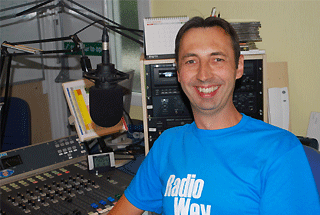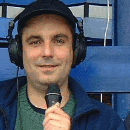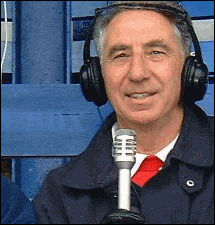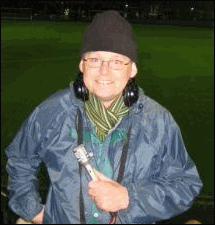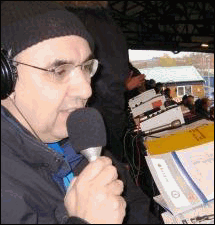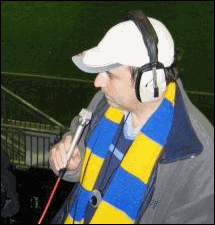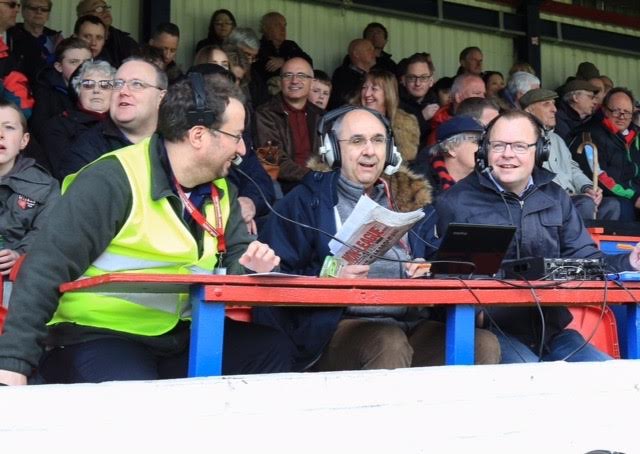Sportscene History
Radio Wey's Sportscene programme has been running for over 40 years and has developed from humble beginnings to our most technologically complex and exciting shows.
Now one of our flagship programmes, here's a brief history of how it has developed over the decades.
1970s
Sportscene all started when Alan Timbrell, one of the founders of Radio Wey, said to Brian Mott: “You’re a Walton & Hersham supporter. How about doing a commentary for Radio Wey?”
At that time teams like Walton, Staines and Woking were struggling; Addlestone were around then so we went there, and Leatherhead were doing well too so that became the best club to follow, albeit that on big match days commentary was done from the roof of the club house!
1980s
Saturday Sportscene was hosted weekly mainly by Pete Bray (who still presents it from time to time still today) who provided updates and results on the major sporting events (football and even the racing) gathered from a TV in the studio displaying the BBC’s teletext service “Ceefax”.
From the mid-80s, the studio desk was manned by Dale Godding, assisted by Jimmy Catton, where they concentrated more on reports provided on the local matches.
We had our own telephone line installed to the Woking ground so were able to provide first half-reports and second half commentaries from that ground with relative ease.
Other grounds required us to ‘tap-in’ to their phone system to connect our O/B unit to them, but luckily we had a number of BT staff on our membership to help us with that, so we were able to provide commentaries from other local grounds like Chertsey and Walton & Hersham too.
1990s
Clive Stevens joined the team of volunteers at Hospital Radio Wey as it was back then in 1990. Having watched non-league football at Staines Town FC since he was 9 years old, he was keen to get involved with the station’s local football coverage. At the time there were 2 studio presenters with just one match covered live with first half reports and second half commentaries.
As Brian was a BT phone engineer by trade, he was able to ensure we had a land line available by hook or by crook! Putting up temporary lines by clambering over the roof of the main stand was an all too familiar event.
Clive realised that as we had two land lines connected to our studios at St Peter's, we had the potential to develop our service. After a year or so, he managed to persuade a close friend and fellow supporter of the Swans to report for us when we were commentating at other matches. Initially he had to use a pay phone from the old Staines club house, but it wasn't long before the task was made easier with the arrival of mobile phones.
2000s
This really opened up the opportunity to further extend our service, and over the next few years we managed to get other friends involved too. We also found that press officers of some clubs were happy to put their team on the map by reporting via mobile phones for home and away matches.
Landlines were slowly phased out at the grounds as we found ways of getting reliable connections from our Outside Broadcast kit to our mobile phones. We were now commentating on both halves of our main match with the studio presenter anchoring the programme.
We developed a studio rota of half a dozen presenters which took the pressure off finding one or two people to be in the studios on a Saturday afternoon every week for 8 months of the year.
We also started broadcasting Radio Wey on line 24 hours a day 7 days a week. For some big matches, we had listeners on line from Spain, Sweden, Japan and Australia! Our peak on line audience was in excess of 900 for a promotion play off final in then what was the Ryman Premier Division.
2010s
The ever growing coverage was testing our ageing equipment and our mobile connections too so we successfully applied for a grant through the National Lottery. This allowed us to invest in specialist sports commentary equipment including a supply of wireless headphones for supporters with visual impairments to sit in the main stand and listen to our commentary.
We couldn't afford even a single ISDN line so we purchased some netbooks capable to connecting to the internet using a dongle or wi-fi if the clubs had that set up.
Our studio engineer and IT man installed Skype in the studios and on our new netbooks too which we used to connect not only to our main match commentary team but also to a couple of reporters on the same group call.
The arrival of all this technology has also totally changed the way we manage the show in recent years.
2017/18 SEASON
The majority of our Saturday Sportscene programme is now anchored by the commentary team with the studio presenter feeding them via Skype messaging all the latest scores and news from the world of sport.
The presenter also lines up reporters on mobile phones for match previews, first half, half time, second half and full time reports, and prompts the commentary team on Skype when someone is ready to report on the line. Some weeks we have had reporters at 10 other matches, which makes it a very busy time indeed for the studio presenter!
Reporters on the Skype group call can message the commentary team of goals, penalties etc and the commentator can then hand over immediately to the reporter for a live update. It's great when we capture a penalty live from another game. It all sounds very professional unless we have intermittent problems with the WIFI or dongle signal but thankfully this rarely happens.
We also have a RED BUTTON service where we can cover midweek or matches on a Sunday without interrupting Radio Wey's regular scheduled programming by having a dedicated separate stream which we can connect to through our netbooks and WIFI or a dongle. Listeners can access this service through the www.radiowey.org website.
Sportscene and coverage has been transformed completely since the early days back in the 80s. From hard wiring emergency telephone lines from a groundsman's hut to our commentary position, to nearly 30 years later, being able to connect multiple reporters on the same wireless phone call. It makes you think where the technology will be in another 30 years!
We think we provide a unique local football service to fans of local non league football both in hospital and at home too. The advances in technology have allowed us to provide all our listeners “a great, reliable and enjoyable service”.
Their words, not ours.
